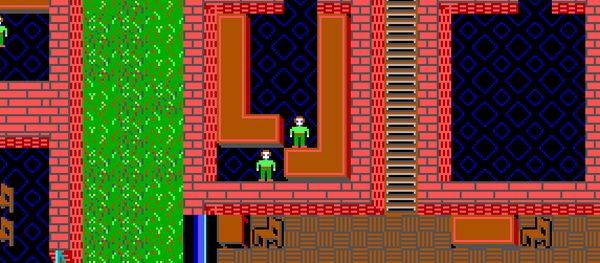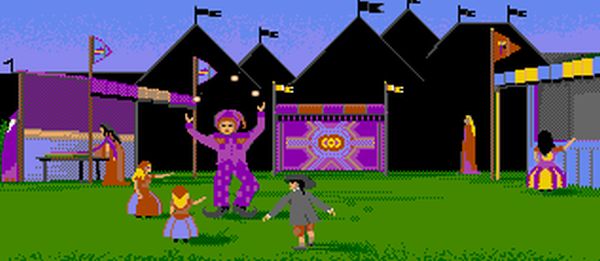You guys forgot the article that shitty john walker did bout the oldscholl:
Kicking It Old School: The Peril Of Kickstarter Nostalgia
Tweet this
When
interviewing Charles Cecil about his Kickstarter for Broken Sword 5, I interrupted him at one point to ask about a claim I’ve heard many making during this recent crowd-funding surge: that publishers prevent innovation. Perhaps they do, perhaps they don’t, but what exactly does that have to do with remaking games people liked in the 90s? I think perhaps this theme reaches its parodic zenith with the title of the proposed project from Brathwaite and Hall:
Old School Role-Playing Game.
Kickstarter success stories have so far been firmly rooted in nostalgia,
not innnovation. We’re seeing some of the biggest talent in the industry openly abandoning the ambition of innovation, and we’re paying them to do it.
Just look at the big success stories. Beginning with Schafer and Double Fine’s bid to make an adventure like they used to in the old days, to Fargo’s relaunching the Wasteland saga, to Obsidian’s promising an RPG like Planescape, to The Banner Saga’s tile-based combat, to Planetary Annihilation’s pledge to be like RTS games you remember.
Even at more modest levels, it’s been about bringing back card trading games, old-school platforming franchises being revived or imitated, a thousand SNES-style RPGs, and so many pixel-styled graphics that the 80s looks sparse in hindsight. Developers have been stating in their own pitch videos, and subsequent interviews, that Kickstarter has often been about finally escaping the clutches of the publishers, able to spread their wings and be creative where the evil money-men would crush them, able to innovate, innovate, INNOVATE!
But almost no one is.
I’m not claiming that this festival of the past is unappealing. Not for a second. I danced from foot to foot at the prospect of a pure adventure from Schafer, a Planescape-styled RPG from Avellone, a new outing for George and Nico from Cecil. I remember enjoying games in the past, and want to enjoy them again now. Nostalgia is often misleading, but what we’re seeing here is the biggest and best names from the 80s and 90s getting the old band back and releasing one more album. As fans of the groups, while there’s obviously the fear that they’ll turn out to be Guns’n'Roses, it’s impossible not to want to hear what they’ve still got in them.
But this isn’t innovation. It’s the opposite. It’s… dennovation? Unnovation? And it rather worryingly tends toward stagnation.
A huge part of gaming has been the advancement of genres, and perhaps most importantly, the blurring of them. And yes, certainly through this process there have been perceived casualties, purer genres that have been lost in the meld, and people want them back. But rather than innovating on those older, perhaps lost ideas, what we’re seeing here is just their being repeated. We’re seeing the best and brightest in games development not pledging, “With your money we’ll make something unique, inspiring, game-changing…” We’re hearing, “We’ll make something the way we used to in the past.” In these large projects we just aren’t seeing anything that can justify the word “innovation”.

It’s not clear where to lay the blame for this. Is it with developers, looking to go back to the happy-go-lucky days of their past, to retreat to what they knew before disillusion crept in? Or is it with the pledgers, willing only to throw the big bucks at the projects that remind them of their happy past, paying out for the comfort blanket of the once familiar?
Or perhaps it’s simply the nature of the model of Kickstarter. In a world where gamers are finally beginning to catch on to the elaborate con of pre-ordering, here we’re being asked to pay for games that don’t even exist yet. And as much as people may wish to ideologically declare that this is about funding development, not purchasing games, you need to look at which are the most popular pledge levels – they tend to be the ones that secure a copy of the game once it’s finished. If pre-ordering is a sucker’s game – paying for something before reviews can warn against – then paying your $25 for a game that the developers openly admit isn’t even yet on a drawing board means you’re going to need certain things in place. And what better thing to have in place than a promise that it will be like that thing you liked before?
So yes, if I see an unknown team asking for $1m to make a new style of action adventure the likes we’ve never seen before, it may well be intriguing, but my e-wallet is likely to stay in my e-pocket. But if I see the guy who made three of my top ten games saying he wants to make another one, I’m seeing if it’s possible to direct debit my monthly wage to the project.
So indeed there are very many reasons why Kickstarter has tended toward nostalgia, and in doing so tended away from innovation. But does this have any longevity?
Perhaps an ideal version of events is that what we’re seeing now is the establishing of a new timeline. A comic-book-style reboot of the gaming world to 1993, to see what direction things would have gone in if the internet had been ubiquitous two decades earlier. The first round will be all these games made in the style of their 20 year old forefathers, but the next stage will be new innovation from them? Maybe in seeing RPGs and RTSs and adventures rebooted, we’ll then see what other possible directions they could have taken, evolved in, and innovated toward without a publisher model requiring homogenisation? Two parallel gaming worlds, Publisher Gaming and Ultimate Gaming?
Or perhaps what we’re seeing is a one-shot blast from the past, a final tour for the aging bands before they admit their frail legs can no longer dance about on stage like they used to. And at the end of it all we’ll have remembered that we liked games in the past a bit more than we like games in the present, oblivious to the fact that we’ve thought the same thing every five years of our lives, and never noticed that we keep adding to the nostalgia pile from the games we said weren’t good enough any longer.

So of course I’m pleased to see the names behind Wizardry and Anachronox (could there be a more apposite name?) making an RPG. But my heart sinks when their pitch video doesn’t begin with saying what new, wonderful ideas they have that they can’t help but want to put in a game, but instead by saying how lovely it used to be to take a cloth map out of a box. Yes, it was! (I’ve petitioned RPG developers for the last decade to return to cloth maps, usually confusing them by calling it a “tea towel” which apparently Americans don’t have.) But no one ever cared about the cloth map they got for a game that wasn’t any good. To see this – this silly nostalgic gimmick – being the lead concept in a project that will be primarily distributed digitally anyway, fills me with worry.
At no point in their pitch video do they say anything about what their game (or games) would be, but instead every time they suggest they’re about to, say, “It’s an old school RPG!”. As if that’s enough. And perhaps this time, maybe this one last time, it is. But surely this is the last time that will work?
And that’s the issue. Kickstarter’s gaming successes strike me as a one-time thing, a round-up of the past, and then done. It’s not that I’m skeptically suggesting that these games won’t innovate and take us to new, unique places – it’s that the developers behind them are boasting that they won’t. (At the same time as saying how the big bad publishers preclude innovation.)
I would so desperately love to see some of the big names coming forward and pitching their project as a New School RPG, or an RTS like you’ve never seen one before, or an adventure that rethinks the way we point and click. A driving game that changes how we think about driving controls, a first-person shooter that is to Half-Life what Half-Life was to Doom, an action-adventure that makes us realise we never saw the potential for the genre.
No, of course, not every game has to be a technological or ideological evolution, but when we’re talking about some of the most talented people in the industry able to work without constrictions from publishers, my goodness isn’t that what we should be hoping for? Not this retreading of what came before, as if it’s some act of inspired rebellion. But then, would we choose to fund it?
Bonus first komment:
Ross Mills says:
Half Life 2 is to Half Life what Half Life was to Doom.
After the Skyrim/Elder Scrolls franchise and Dragon Age/Mass Effect Franchise, I don’t see why people want to go backwards, either. Sure, make new games, and if a gametype (ie Group Combat D&D-Style RPG) inspires you go for it! But most of the premises that make people pay for Kickstarters seem like the same whiners who are like “X Game isn’t like X-1 Game” and get super butthurt.



































